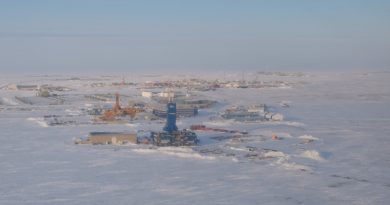Travellers transiting to/from Alaska through Canada will have their cars tagged

As of July 31, Canada Border Services Agency (CBSA) has implemented stricter rules for travellers transiting to or from Alaska through Canada in order to contain the spread of COVID-19.
The Canada U.S. border has been closed to non-essential traffic since March 21, but non-discretionary travel between the Lower 48 and Alaska related to things like work or travel to a primary residence, have been permitted with tight regulations, such as staying on main arteries and designated travel routes, and that public health advice should be followed that travellers stay in their vehicles as much as possible and to minimize contact with locals by paying at the pump for gas and using drive-throughs for food.
But starting Friday, travellers by road will also be required to place hang tags on their rear view mirror to indicate they are transiting. The tags will also include the date they’re required to depart Canada by, as well as a list of the regulations they will be required to respect while transiting, the CBSA said in a news release on Thursday.
Proof of reason for travel advised
Foreign nationals are also required to arrive at one of five authorized Canadian points of entry: Abbotsford-Huntingdon, Kingsgate or Osoyoos in the province of (British Columbia), Coutts in the neighbouring province of Alberta or North Portal in Saskatchewan.
CBSA also recommends having proof of the reason for travel when arriving at the border.
Penalties for violating border restrictions under the Quarantine Act can run up to $750,000 in fines and/or 6 months in jail. If death or serious bodily harm result from violating the regulations penalties run up to $1,000,000 in fines, and/or imprisonment of up to 3 years.
Write to Eilís Quinn at eilis.quinn(at)cbc.ca
Related stories from around the North:
Canada: Inuit gov. in Labrador, Canada tells out-of-province travellers to stay away despite ‘Atlantic bubble’, Eye on the Arctic
Finland: Finland joins other Nordic countries in virtual tourism due to pandemic, Yle News
Greenland: Greenland extends COVID-19 entry requirements until July 20, Eye on the Arctic
Iceland: Iceland reinstates COVID-19 restrictions after spike in domestic infections, Eye on the Arctic
Norway: Norwegian Arctic wilderness tourism hit particularly hard by coronavirus, The Independent Barents Observer
Russia: All Russia’s North Pole cruises rescheduled to 2021, Eye on the Arctic
Sweden: Sweden seen as major source of COVID-19 in Western Finland region, Yle News
United States: Airline shutdown creates new challenges for rural Alaska, The Associated Press



